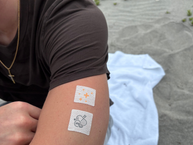Depression is unfortunately all too common, and it’s likely that either you or a loved one have suffered with it. What you may not know is that depression can sometimes be a result of nutrient deficiencies.
These are some symptoms of depression:
- Frequent feelings of sadness or hopelessness.
- Being irritable for little to no reason.
- Feeling worthless or guilty.
- Feeling frequently fatigued or having trouble focusing and/or finishing tasks.
- Being uninterested in normal activities.
- Feeling very hungry or not having an appetite.
- Trouble falling asleep and/or staying asleep.
Many essential vitamins and minerals are required to maintain a normal mood and health.* In addition, there are a variety of natural supplements that have historically been taken to treat or manage symptoms of depression.* If you or someone you love has been impacted by depression, PatchAid Vitamin Patches contain ingredients that could be beneficial to you.
While many factors can contribute to depression, there are many possible treatments for it as well. Be sure to talk to your doctor if you have depression or symptoms of depression before taking any vitamins or supplements.
Below are listed some vitamins and supplements that have been successfully used to treat or lessen symptoms of depression, as well as various PatchAid Vitamin Patches that contain each of these ingredients.
B Vitamins
There are a range of B vitamins, and many support functions that if deficient, can be linked to depression symptoms. For example:
- Vitamins B1, B2, B3, B5, and B6 are all required for normal energy metabolism and the use of protein, carbohydrates, and fat for fuel. Without them, you can expect to feel tired since your body will not be getting the fuel it needs.
- Folic acid is essential for producing healthy red blood cells that deliver oxygen to cells in your body. A deficiency can leave you feeling fatigued and short of breath, since your body won’t be getting enough oxygen.
- Vitamin B12 is needed for healthy red blood cell production, as well as for protein metabolism, and has a role in mood and brain health. A deficiency of B12 is linked to a heightened risk of depression.
There are a lot of foods with different B vitamins. Meat, poultry, nuts, whole grains, vegetables, fruit, and beans are some of them.
The PatchAid B12 Energy Plus Vitamin Patch has all of these vitamins, along with herbal ingredients such as ginseng, rhodiola, and choline. These ingredients are also contained in the PatchAid Multivitamin Plus Patch.
Vitamin C
You may think of vitamin C as an antioxidant or an essential vitamin for immune support, but it’s also important to maintain good mental health. A deficiency in vitamin C can increase the chance of having depression, experiencing feelings of anger, and increased confusion. Kiwi fruit, citrus fruit, strawberries, tomatoes, onions, bell peppers, and broccoli are some good dietary sources.
You can get vitamin C from the PatchAid Vitamin C Plus Patch, as well as the Multivitamin Plus Patch, Iron Plus Patch, Antioxidant Vitamin Patch Pack, and more.
Vitamin D
Vitamin D is often called the sunshine vitamin because exposure to rthe sun triggers your skin to produce it. But did you know that it can also put a bit of sunshine into your mood? Vitamin D deficiency is linked to depression, and people with depression are more likely to have low vitamin D levels.
People who live in northern climates, older adults, and people with dark skin are a few groups that are at higher risk for low levels. While some fatty fish are a good source of vitamin D, if you’re not able to get enough from exposure to the sun, a supplement is likely to be very helpful.
The PatchAid Multivitamin Plus Patch has vitamin D, as does the Vitamin D3/Calcium Plus Patch.
Magnesium
Magnesium deficiency is linked to anxiety and depression, as well as confusion and insomnia. Magnesium has been used to address headaches and trouble concentrating. It’s in foods such as whole grains, dark chocolate, legumes, and dark green vegetables such as kale.
The PatchAid Multivitamin Plus Patch has magnesium. Magnesium is also in the Vitamin D3/Calcium Plus Patch, Immune Defense Plus Patch, Focus and Clarity Patch, Relax and Unwind Patch, and Migraine Relief Patch.
Rhodiola
Rhodiola rosea is known as an adaptogen because it helps your body with the stress response. It’s been taken to support a better mood through affecting neurotransmitter activity and the way your brain sends and receives signals.
PatchAid Patches with rhodiola extract include the B12 Energy Plus Patch, Relax and Unwind Patch, and Focus and Clarity Patch.
Omega-3 Fats
There’s already a ton of evidence supporting the role of omega-3 fats in normal brain and heart health. Studies are also looking into how omega-3 may affect mood and risk for depression. Natural sources include flaxseed, walnuts, and fatty fish, such as tuna, salmon, herring, and mackerel.
The PatchAid Omega-3 Plus Patch has EPA and DHA, which are two long-chain omega-3 fatty acids. There is also krill oil and a short-chain omega-3 fatty acid called ALA. Antioxidants include astaxanthin and coenzyme Q10.
Using Vitamin Patches for Depression
If you are experiencing symptoms of depression, the last thing you need is the burden of remembering to take your vitamins or worse, experiencing stomach distress related to digesting vitamin pills.
PatchAid Vitamin Patches are easy to use. Just peel and apply the sticky side to a clean, dry area of skin that doesn’t have hair on it. You can leave the patch on for up to 8 hours. During that time, you can go about your regular activities, whether you’re sleeping or working out. You can even swim and take a shower while wearing your patch.
Vitamins can help with depression if your symptoms are caused by vitamin deficiencies. Vitamin Patches by PatchAid are easy ways to get vitamins and other natural supplements. Be sure to talk to your doctor about depression and the possibility of taking supplements.
*The Food and Drug Administration has not evaluated these statements. PatchAid patches are not intended to diagnose, treat, cure or prevent any disease. Anyone with a medical condition should seek the advice of a licensed medical practitioner. Individual results may vary.







